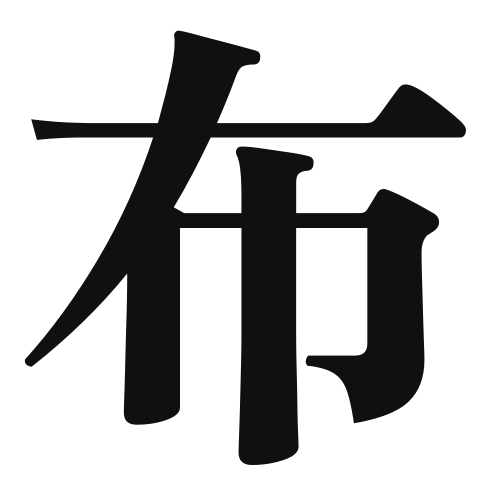1. Overview of Meaning
The kanji “布” (pronounced “nuno” in Japanese) means “cloth” or “fabric.” It refers to materials made from fibers that are woven or knitted together, commonly used for clothing, textiles, and other purposes.
2. Formation and Radicals
Formation of the Kanji: The kanji “布” is a pictogram, originally depicting a piece of cloth spread out. It is classified as a phonetic-ideographic character, where the shape represents the concept of cloth.
Radical: The radical for “布” is “巾” (kin), which also relates to cloth or fabric, indicating its connection to textiles.
3. Examples of Usage
Common Words and Phrases: Some frequently used words that include “布” are:
- 布団 (futon) – bedding or comforter
- 布地 (nunoji) – fabric or textile
- 布製 (nuno-sei) – made of cloth
Example Sentences in Daily Conversation:
- この布はとても柔らかいです。 (Kono nuno wa totemo yawarakai desu.) – This cloth is very soft.
- 新しい布団を買いました。 (Atarashii futon o kaimashita.) – I bought a new comforter.
4. Synonyms and Antonyms
Similar Kanji: A similar kanji is “織” (shiki), which means “weave.” While “布” refers to the finished product (cloth), “織” focuses on the process of weaving fibers together.
Antonyms: An antonym could be “剥” (haku), which means “to peel” or “to strip,” representing the action of removing layers, contrasting with the idea of creating or forming fabric.
5. Cultural and Historical Background
Connection to Japanese Culture: In Japan, cloth has significant cultural importance, especially in traditional clothing like kimono. The use of various fabrics is often tied to seasonal festivals and ceremonies.
Proverbs and Idioms: One common saying is “布団を干す” (futon o hosu), which means “to air out the futon,” emphasizing the importance of cleanliness and freshness in Japanese culture.
